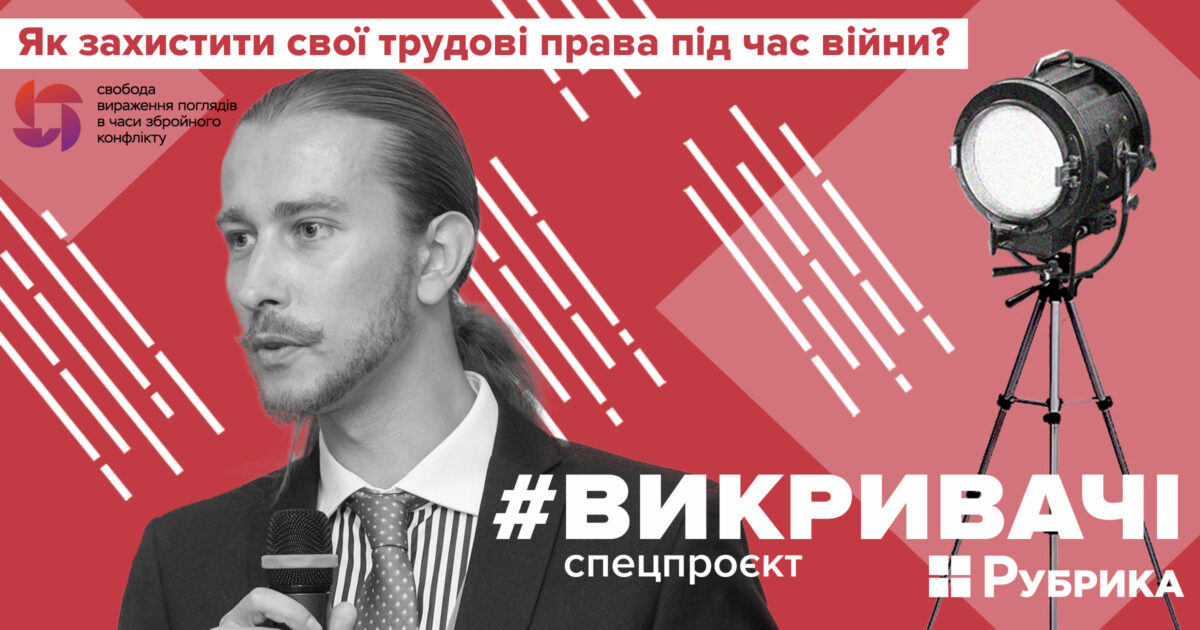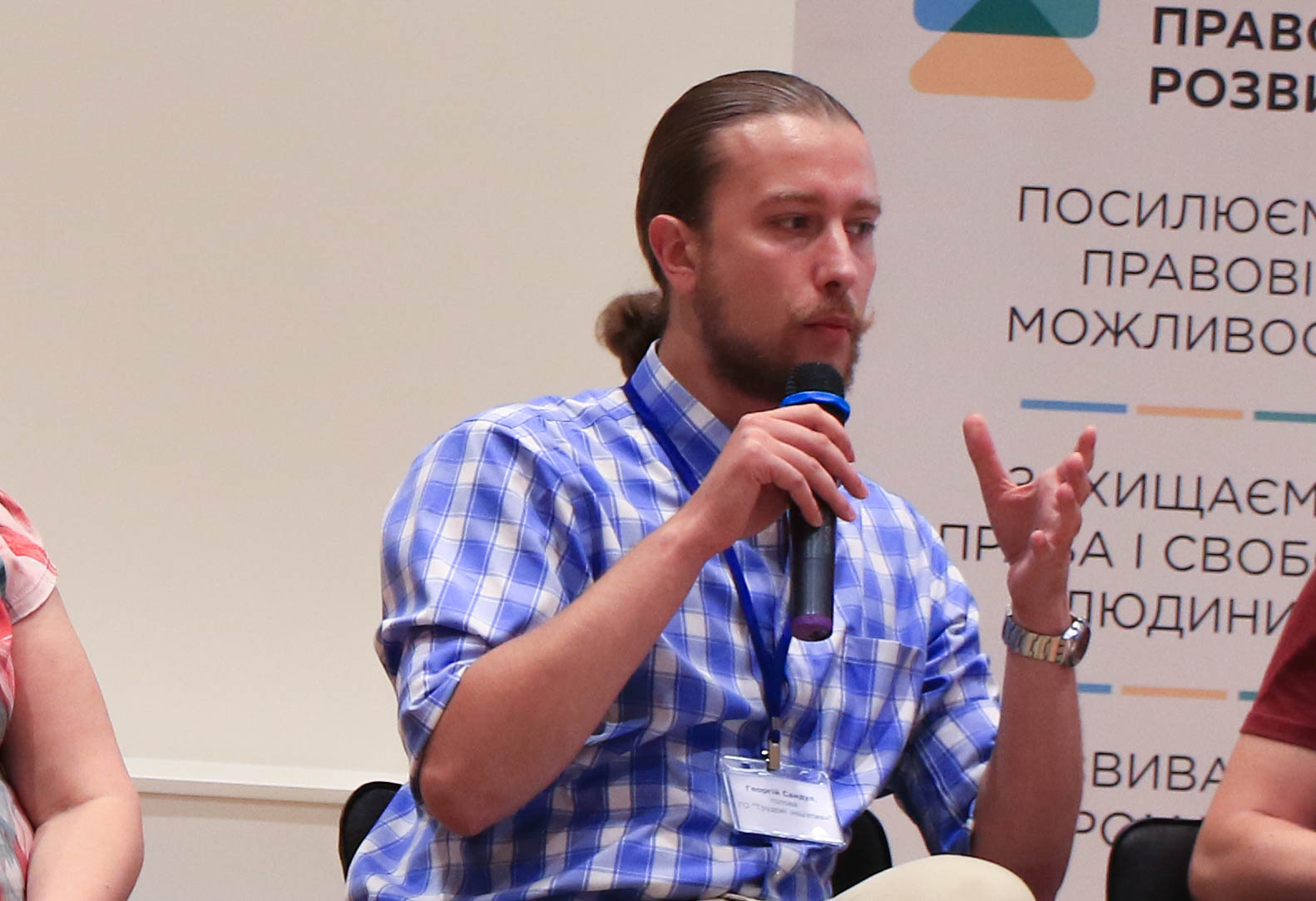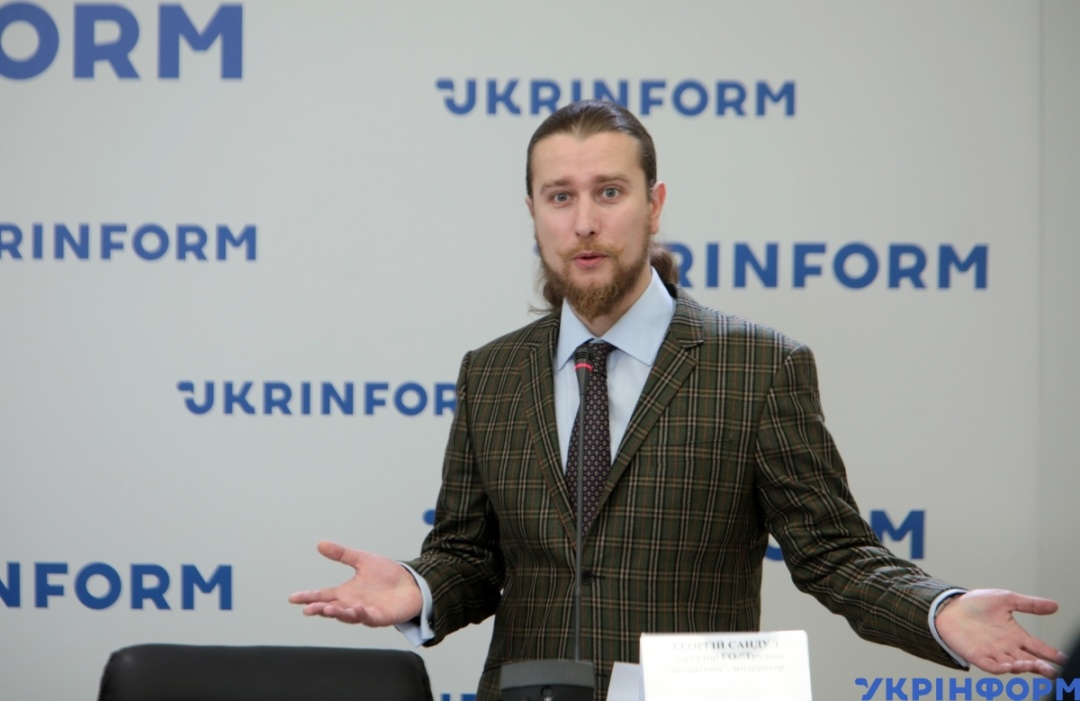
During russia's full-scale war in Ukraine, millions of Ukrainians were forced to leave their homes, jobs, and everyday lives. The International Labor Organization estimated that Ukrainians lost almost 5 million jobs due to the war in Ukraine. Of them, 1.2 million refugees left for neighboring countries, and 3.6 million are unemployed people living in Ukraine. Moreover, some enterprises in the zones of active hostilities or temporarily occupied territories cannot function properly and provide workplaces to their employees. How did the labor rights of citizens change during the war, and what tools exist to protect them? Find out in an interview with Labor Initiatives' chief Heorhii Sandul.

Employment contract suspension and other innovations
— How did labor legislation change after February 24, when martial law was introduced in the country?
— It has changed, to put it mildly, dramatically. Due to russian aggression, people started to lose their jobs. Many enterprises were affected. However, we have been undergoing labor reform for the past several years, and it reached an exciting phase in March 2022. Then, draft law No. 2136 on regulating labor relations during martial law was submitted to the parliament. In my opinion, it introduced several not very good innovations, for example, suspension of the employment contract. It means that the employee is not formally dismissed, the job is retained, but the person is not paid a salary. russia will someday pay this salary as part of the reparations. Of course, no one will demand normal working conditions at a destroyed enterprise, but this law did not diversify economic activity and regions. Therefore, the termination of the employment contract can be resorted to, for example, in a coffee shop in Uzhhorod. Still, a coffee shop in Uzhgorod is somewhat different from, for example, a coal mine in the Donetsk region.
We have warned that the law has many opportunities for abuse by unscrupulous employers. We saw that many used it to suppress activists at enterprises, the same whistleblowers of corruption. There were many attempts to suspend labor contracts, for example, at Ukrzaliznytsia Railways. In the same way, the Nova Poshta postal service stopped the employment contracts of many employees. Even at the Chornobyl nuclear power plant, they tried to suspend labor contracts when the russians occupied it.
It's important to understand that ensuring a reliable rear is almost as important as the Ukrainian Forces' regular work because it stimulates domestic demand. For instance, if the company can pay its employee, this person, having funds and buying something in a local coffee shop or store, provides work for other people; from this, entrepreneurs pay taxes, which go, among other things, to the army. But lobby groups pushed through these bills. The most egregious thing is that they tried and are trying to push through bills that would curtail labor rights in peacetime.
— Which labor draft laws are unacceptable to the public?
— There was draft law No. 5388 on deregulating labor relations. The [Verkhovna] Rada [Ukrainian parliament, ed.] failed it, and now draft law No. 5371 is being prepared for the second reading—Saakashvili's office was developing it. It deals with a massive reduction in labor rights at small and medium-sized enterprises employing up to 250 people. In our country, as 2019 statistics show, about 73% of all Ukrainian workers worked at such enterprises.
On July 1, the Verkhovna Rada adopted draft law No. 7251, which outraged everyone, and the military community got up in arms about it. Currently, the average civilian salary is kept for volunteers who joined the army; it is a logical norm to support families. The draft law approved on July 1 abolishes this norm, so there will be no civilian earnings. That is, there is a social aspect (people will have little to live on), an economic factor (reduced domestic demand), and a political view because we are probably, for the first time, in a situation where people trust the government so unprecedentedly. Therefore, the big question remains, why should this trust be undermined now.
Yes, tectonic changes are taking place in the labor field now, and they are swift, but a general approach, when they say we will unload the business and put everything on the workers, especially those who serve, is very wrong. It is necessary to approach various enterprises in a more diversified manner because some work very well, and it becomes a reason for abuse. The problems did not disappear but intensified. Under the new martial law, the rights of trade unions have been significantly curtailed. It is logical that in wartime, we cannot do protests, strikes, etc., but we can negotiate. Now we see that effective structures, even before the war, can somehow get out of their way and deal with employers. It is crucial when people are united and have some negotiating position. In this case, they can achieve something even in wartime and somewhat restricted labor rights.

Accelerated procedures, the EU, and social dialogue
— How do you and your colleagues from Labor Initiatives assess what's happening in labor relations, voted by the parliament since the full-scale war began? Do you think these changes are justified? How appropriate was it to vote for them?
— The issue of labor reform, particularly during the war, is very heterogeneous. That is why many laws are passed, which constantly contradict each other. Most of the legislation was aimed at certain restrictions on the labor rights of employees. We all understand that the economy is not what it was before the war, and the state could introduce certain conditions. But this leitmotif of the reform and how the authorities procedurally carried it out is very general. It drove many people into a situation where they were left without rights.
The thing is, even during a full-scale war, we should do it in a civilized manner. For example, Basic Law No. 2136 on organizing labor relations was adopted in a few days. People did not even have time to write an analysis, not to mention that no significant employers or trade unions were consulted, as required by the law on social dialogue. Yes, rights are currently limited, and people are still getting away with it somehow. Still, the legislative initiatives now in place are aimed at restricting labor rights in peacetime.
Let's imagine the war ends now, and we need to return millions of migrant workers to rebuild the country. What is a person's motivation to come back, for example, from Poland or Lithuania, if there are no opportunities to protect their labor rights? What is proposed, in particular, by the draft law No. 5371 mentioned earlier is depriving small and medium-sized enterprises of fundamental rights. Therefore, it's necessary to evaluate a three-component structure: social (well-being of each household), economic (so that people can work), and political (attracting people to Ukraine).
The labor reform wasn't procedurally perfect during the war, and we would like a more civilized social dialogue in Ukraine. Considering Ukraine being granted candidacy to the EU and the Association Agreement having Article 296, which says that none of the parties (neither the EU nor Ukraine) has the right to weaken or reduce the level of environmental or labor protection provided for in its legislation, to attract direct foreign investment. That is, it can become an obstacle to membership in the EU.
— What does the Association Agreement say about labor rights? How should they change?
— There is a clause in the Association Agreement that Ukraine should stimulate social dialogue—the state, employers, and trade unions. In European labor law, the laws may not even reach the employee. Still, the rules of the game are provided at the local level, according to which employers and trade unions agree on salaries, working hours, etc. We have not yet developed such a labor culture. I hope we will take this from other European countries because it is a typical European social dialogue.

Reduced working hours and layoffs: what to do?
— Some enterprises switched to reduced working hours or declared downtime, and some businesses closed. What should employers do in this case? How should employees protect their rights?
— The Constitution [of Ukraine] says the guarantor of our rights is the state. There are state programs to relocate enterprises to western Ukraine. If the employer does not cope, they may receive state support. That is, there's no universal solution, and there was none before the war because enterprises from different industries have different forms of ownership. Therefore, the question is for local authorities, trade unions, and civil society. Even before the war, little attention was paid to labor rights, but now this issue has become urgent. The state should intervene not only to deregulate labor rights. It should look at the social system and labor sphere because it is unrealistic to leave it only on the "it is how it is" condition and the employee/employer regulation.
— It became much easier to fire an employee during the war. Under what conditions can the employer do this? What has changed for employees? How can they protect their rights?
— Law No. 2196 on regulating labor relations during martial law states that if the enterprise cannot function, the procedure for suspending the employment contract is applied. Yes, there are cases when people prove in court that the employer broke the employment contract illegally because the enterprise is functioning. But now, going to court is very expensive and challenging. We often see that even profitable companies suspend employment contracts and don't fire employees because there is a provision in the law that the employer can unilaterally suspend the effect of some provisions of the collective agreement. You can fight it, but the court process was complicated even before the war. Currently, we see positive examples with courts only in cases where the enterprise has an active trade union. At the same Chornobyl nuclear power plant, when a shutdown was planned, the trade union managed to prevent it from happening. Currently, the tools to protect labor rights are minimal. What can we do in any unclear situation? Contact the media; no one rules this out. Organizations active in the media can thus influence the legislative field and the protection of a specific employee. Therefore, people are now fighting for their reputation.
— If the employee found themselves abroad or evacuated to a safer place in Ukraine, can the employer fire them?
— Not really. Our law states that "dismissal for absenteeism" is dismissal for not showing up for work without valid reasons. If rockets are exploding in your city and you are therefore moving to another area, then, most likely, it is a good reason. Even in the first days of the war, the Ministry of Economy explained that if an employee didn't get in touch, they could not be fired just like that. But there are many cases when, for instance, a person who took refuge in Poland receives the message, "Tomorrow we go to work. Otherwise, you will be fired." The Ministry of Economy says the employer must approach this issue in good faith. That is, we are talking about evaluation judgments of the reason for not showing up for work. Suspension of employment contracts is possible, and layoff is possible, but everything must be within the limits of the law. Due to the general use of wartime regulation, we now see many violations of workers' rights relocated to other regions of Ukraine or abroad.
— If a person has returned from abroad, do they have a priority right to get their job back? Or if the employer has already hired another person in their place, then not?
— No, they don't. If a person has been fired, they have no priority right to their former workplace. It is if a person was officially employed. Unofficial employment is another territory of lawlessness in Ukraine. That's why those who worked unofficially were the first to suffer. During martial law, the State Labor Service cannot carry out routine checks to detect undeclared work, which is now rampant. Before the war, about a third of our people worked unofficially. Now, it will be even more.
— How is an employee declared downtime when it's the employer's fault?
— Downtime means ⅔ of the average monthly earnings. Now companies often use it. They often resorted to this during lockdowns.
— If a person is laid off, are there options to appeal this decision and protect their labor rights?
— Laying off is the right of the employer. There must be a socio-economic justification for this. If before the war, it was necessary to notify about a change in essential working conditions two months in advance, during martial law, this norm is canceled, and the employer can do it every day.

Days off, salary, and leave during martial law
— How did the length of the working week and the number of days off change during martial law?
— Regulation of working hours has changed. The law on labor relations during wartime allows regular working hours of up to 60 hours per week. But such changes must be agreed upon with the trade union. Of course, provided that the company has it. An increase in working hours can apply to enterprises of any form of ownership, and wages don't increase under these conditions. Here, the question arises if it means increasing working hours in a coffee shop or cartridge factory. Local trade unions can influence this. As for public holidays and days off, the rules for moving the day off to Monday don't apply. For example, a day falls on a Saturday or Sunday.
— Can people go on vacation during martial law? Has its duration changed? And is it paid?
— You can go on vacation. The duration of the leave has not changed—24 days. It is paid, as it was before martial law. You can also take a vacation at your expense without saving your salary.
— Can an employer not pay wages during a war? And if it is a state institution financed from the state budget?
— No, it is the employer's duty, and no one has canceled this rule. As for government work, it is another realm altogether. So, for example, civil servants are subject to the law on preventing corruption. Suppose a person from Kherson moved to the western region but cannot go to another job. Draft law No. 7251, which repeals the norm on paying military personnel, allows civil servants to work part-time until the end of wartime. What to do with it? Expect some reparations. But when will they be? After all, people need to eat here and now.
— If a person was unlawfully dismissed or not paid wages during martial law, what should they do in such situations?
— First, you need to officially contact the employer, stating that you know your rights. It is better to solve it without a court. But if there's no response, then go to court. It is also necessary to find out if the company has no money and is bombed. If yes, why sue it. And if it is some kind of megacorporation that skimped on the salary, then you need to sue and assess the situation. If there is a trade union at the enterprise, you can contact it, and through their procedures, you can achieve something.
— What cases of citizens are Labor Initiatives currently conducting in courts? What actions do you support?
— The appeals mainly concern illegal firings. Some cases have been going on since before the full-scale war. There are cases regarding non-payment of salaries and also cases against corruption whistleblowers. The situations generally concern "distortions" on the ground, unscrupulous employers, and reprisals against disagreeable people. People apply from various fields—aviation, metallurgy, agribusiness, and railways. Sometimes the trade unions take them. Where they can't, because it is pretty expensive to have lawyers, we help. Now, we don't have a lot of "field" work, in contrast to working with legislation, because it's necessary for everyone to understand the existing rules of the game. We are trying to influence the reform process with all available tools so that it is beneficial to the state, business, and employees.
— If a person has become a victim and wants to protect their labor rights, what services can they get from Labor Initiatives?
— They can get any legal advice. Our contacts are on the website. We will tell them how we see the case, what a person should do, and prepare all the documents needed to defend their labor rights.
Newsletter
Digest of the most interesting news: just about the main thing












